How do you turn themes and ideas into a real story?
Here I share my train of thought in fleshing out setting, characters, and plot points.
Here I share my train of thought in fleshing out setting, characters, and plot points.
ECONOMICAL STORYTELLING
As a one man production, I realistically could not go over 5 minutes for my film if I didn’t want to compromise the quality. How do you tell a complex story about a parent-child relationship tattered with hurt and resentment in less than 5 minutes? Here were some parameters that helped me make some narrative decisions:
01_The history between the two characters should not require more than a couple shots to understand.
01_The history between the two characters should not require more than a couple shots to understand.
02_...and yet, it should still reveal how the parent utterly failed the child.
03_The trauma has to be scarring enough we can empathize with the child's inability to move on.
Thus, "father leaving the child a long time ago" became the trauma of choice!
WHERE & WHEN
This meant the story had to take place during a time when you couldn't just Google people and maybe run into their socials where you find their life updates. As I knew from early on that I wanted my child character to be in a suit, I was easily able to picture him strutting about on Wall Street during the Reagonomics era when the hyper-confidence in capitalism congested the air. Setting the film in the 1980s meant the father would have left the child somewhere in the 50s~60s. This could justify decking out the father character with a mid-century modern wardrobe and car, which is an aesthetic I always make an excuse to draw.
WHY: EVERYONE HAS A BACKSTORY
I found my characters and their dynamic, and what the drama between them was going to be about. Now I actually needed to tell the story. Rather than arbitrarily deciding on a destination and forcing the characters to get there, I wanted them to each have a motivation for why they made the decisions in the past, which took them to where they are now. Basically, I wanted to know their backstory — almost as if to understand my own fictional characters better. So here it is:
Frank(the father), who came from a humble background, married Nick(the son)’s mother, who came from old money. Initially having gotten a lot of help from the mother’s family, Frank always had a chip on his shoulder and perpetually felt the need to prove himself. In fact, his obsession with validation reached a point it overshadowed the value he saw in having a family. It finally pushed him to leave Nick and the mother, telling them and himself it would just be temporary, in hopes of making it big and coming back as a successful businessman to impress the family.
Up until Frank left, Nick had great memories with Frank — he very much respected and looked up to Frank. Hence, Nick was struck with a particularly acute sense of betrayal by his father’s indefinite departure. Though resentful toward Frank, deep down, Nick still longs for the bond he had with his father. It is possible that in pursuing finance, he was subconsciously choosing a career he thought his dad would find worthy.
While it's questionable whether this backstory seamlessly fits with the film I ended up with, the exercise was instrumental in making narrative decisions about how the characters would respond and behave.
WHO: LEANING INTO TROPES
There are certain types of people and places that films throughout history have conditioned us to associate with specific character traits. Blame society and their biases, but look how much exposition I get to skip.
N I C K ( T H E S O N )
In case you didn't hear me 50 times already, I wanted my protagonist to be a child in a suit. To me, a man in a suit is the epitome of professionalism we identify with a competent adult. Pair that with sleek pushed-back hair and a DeLorean-inspired sports car he drives to his corporate job, we have our successful yuppie character.
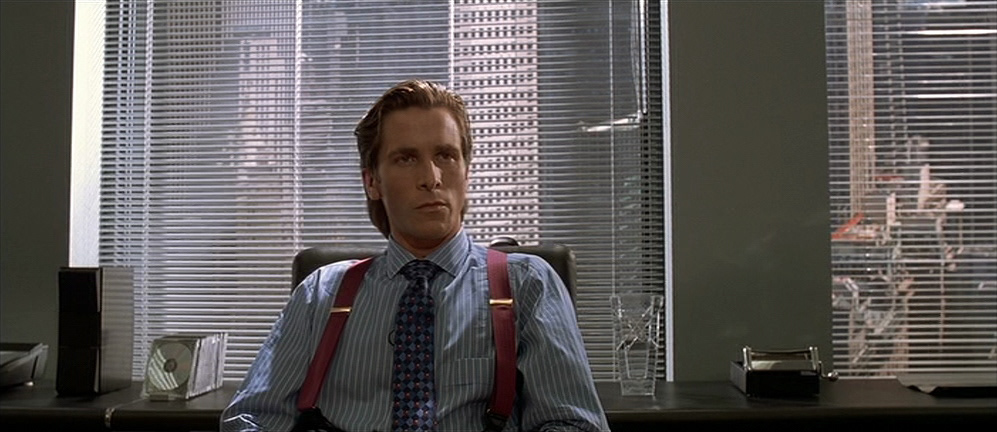
"American Psycho" (2000)
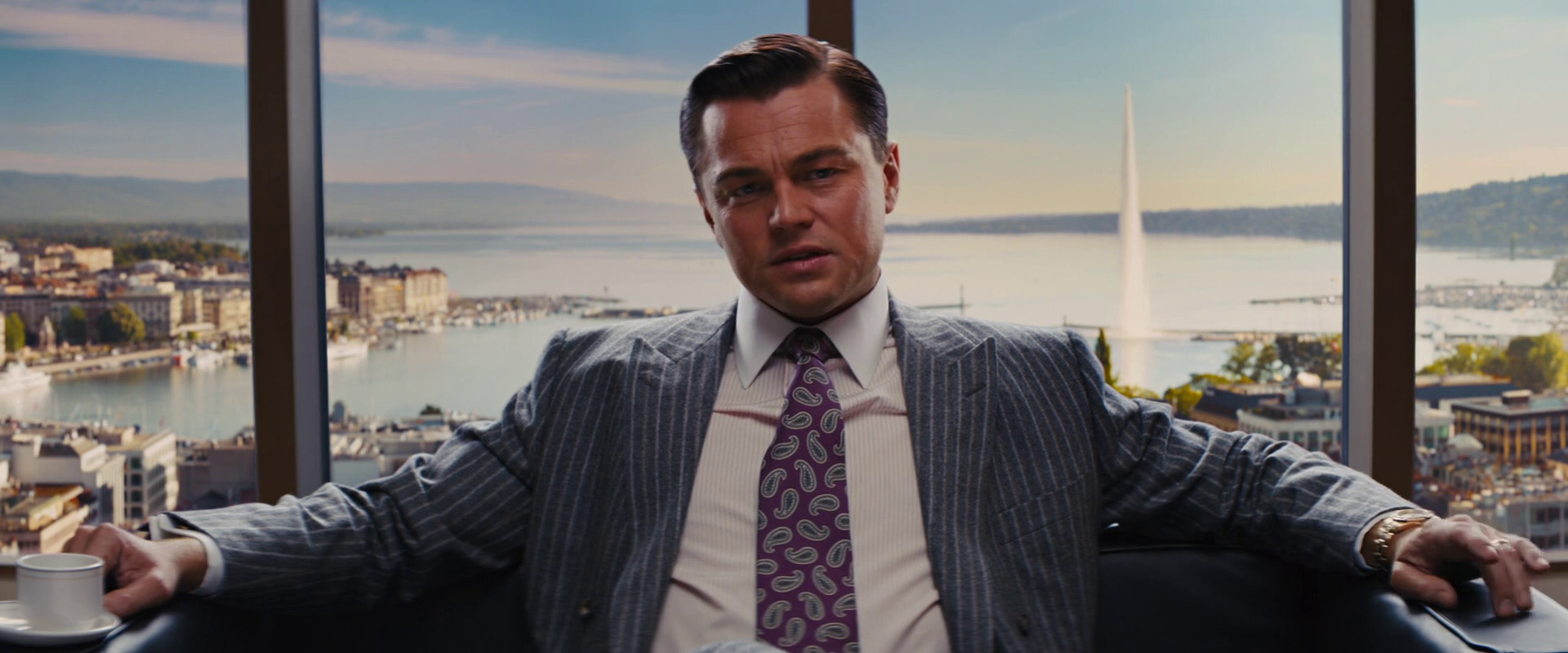
"The Wolf of Wall Street" (2013)
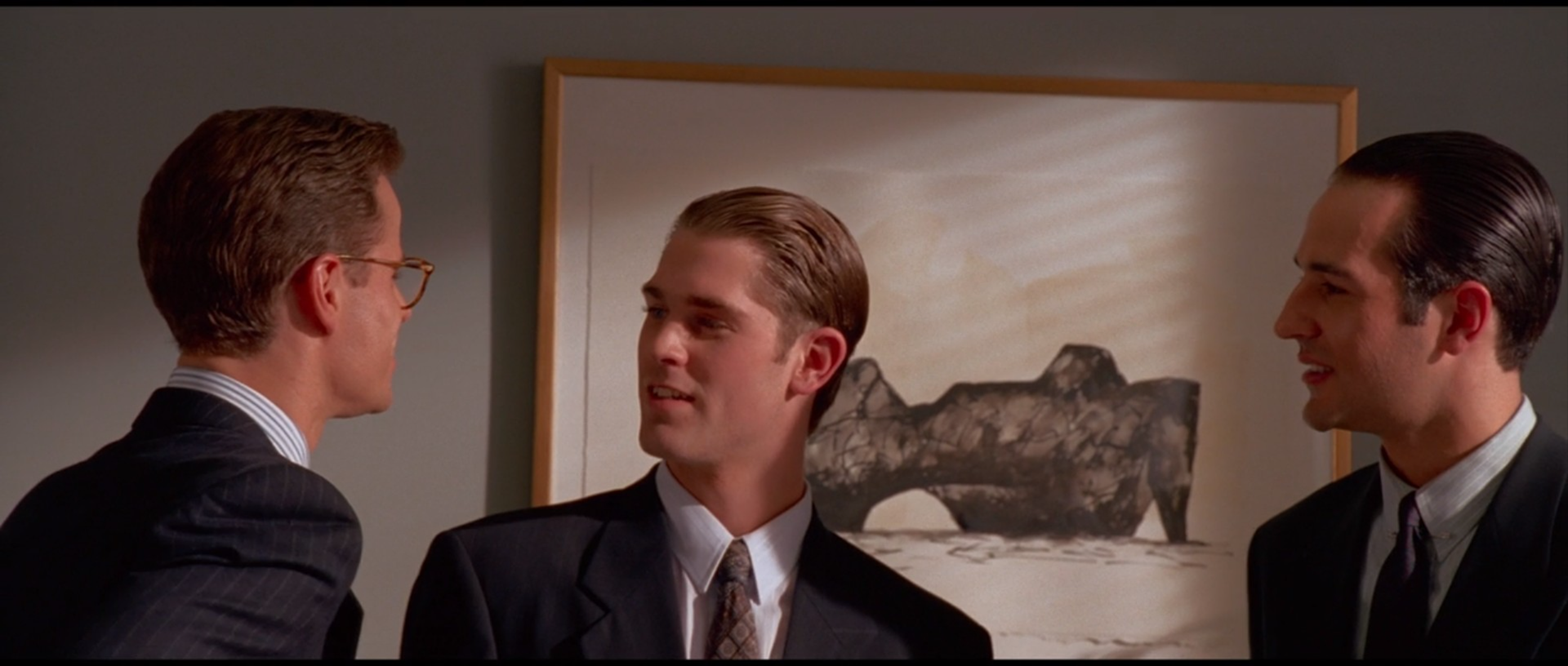
"American Psycho" (2000)
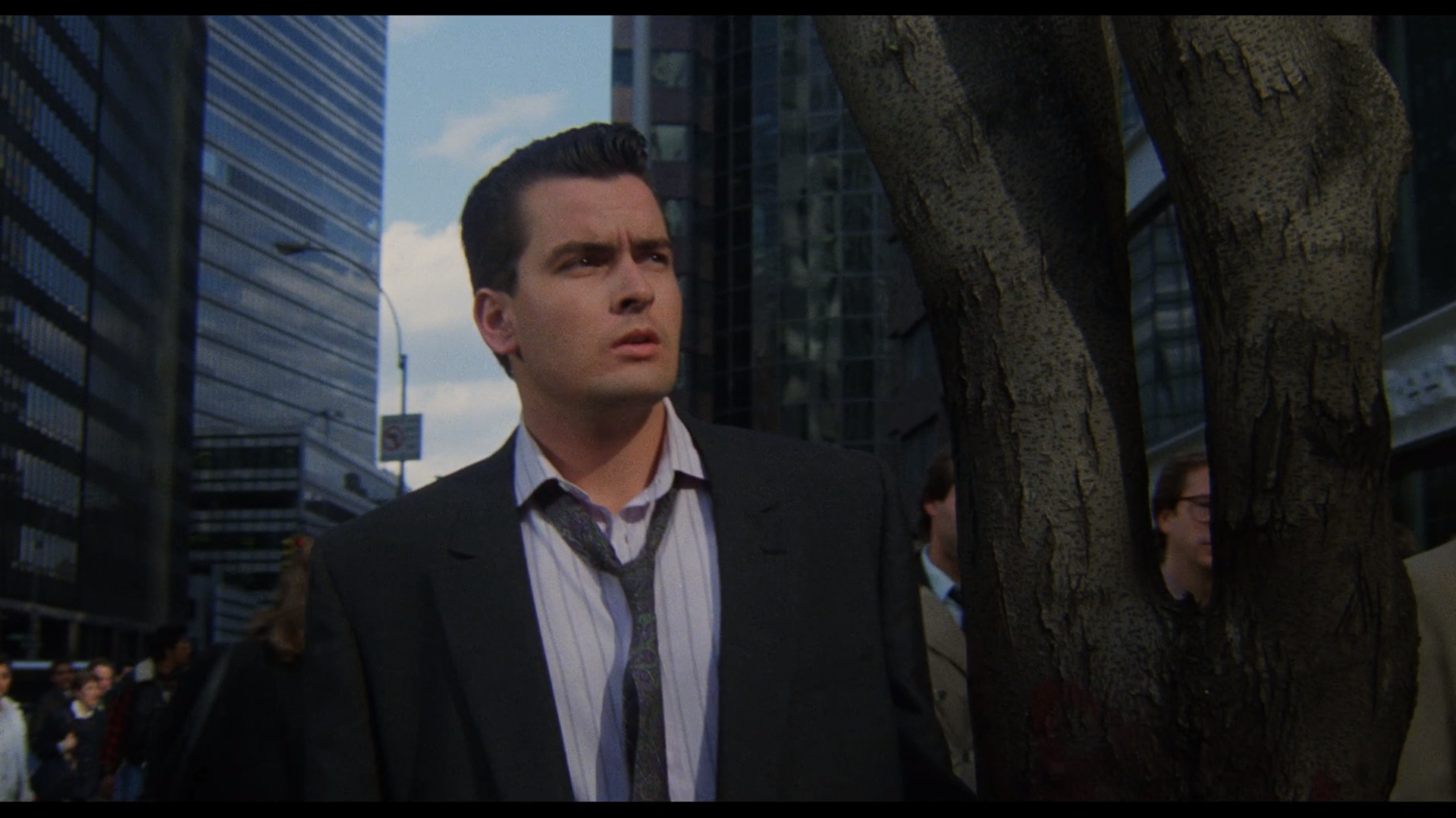
"Wall Street" (1987)
F R A N K ( T H E F A T H E R )
I wanted the father to exude “alpha male” energy at first glance because:
01_ It seems a sense of admiration, respect and even idolization commonly dictates a son-father dynamic more so than tenderness. According to my backstory, before Frank left, Nick looked up to Frank like Frank was the sky. As Nick's idol, his superhero, Frank needed to look his part.
02_ (See STORY BEATS below) Upon their first encounter, Frank is essentially begging Nick for his attention. This reversal of power, where the adult is at the mercy of the child’s decision, could be dramatized by the size difference between the two characters.
03_ When we later see the older, frailer version of the father, the physical difference from his younger prime self feels especially jarring.
My mind immediately went to a Don Draper type of a brawny man in a tailored suit and a hat, radiating traditional masculine confidence and charisma.
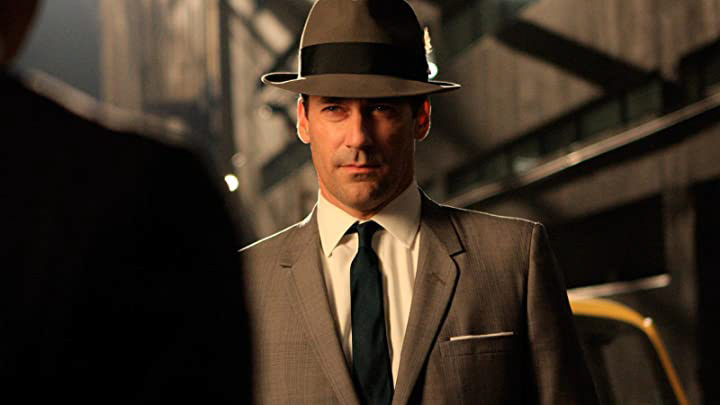
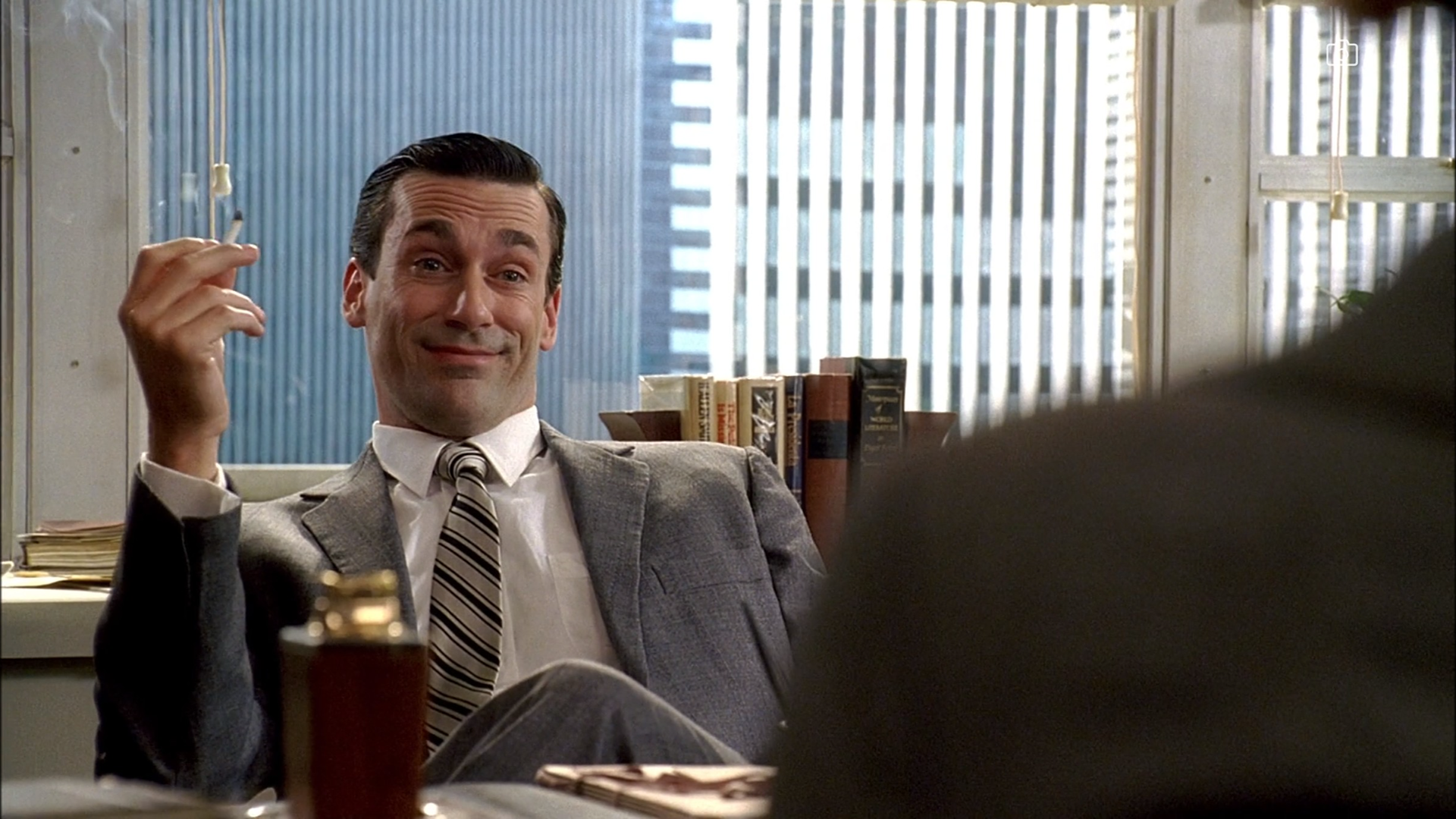
STORY BEATS
Once I had a general sense of what the story was going to be about, I went on to establish specific story beats. It's amazing how much a writing exercise like this can help find the visual language along the way; the word choice (i.e. polished, primped, etc.) with which you describe your story beats ends up informing the look & feel you're after during visual development. (Please note: these were the initial beats I started with, which later evolved significantly.)
We open with our eight-year-old Nick starting his day with a polished morning routine. Despite his visibly young age, we quickly gather that Nick isn’t just any precocious child — he essentially is living what appears to be an idyllic grownup life with a big beautiful suburban home, a car, and a stable job.
However, Nick’s perfectly primped composure starts to collapse at the unexpected appearance of his father (Frank), who Nick clearly has a complicated history with. Despite Frank's plea, Nick refuses to even engage with Frank, leaving him behind. As Nick drives away, we get a glimpse of Nick’s past with Frank where we discover that in the past, Frank had left Nick. By the end of the flashback, Nick sobs in his car in a manner that finally feels appropriate to his eight-year-old age.
The next day, as Nick walks out of his office building, he steals a glance at the same spot his encounter with Frank took place the day before. Frank is not there. Before the disappointment can sink in, Nick soon notices Frank secretly watching from a coffee shop across the street.
We find Nick and Frank at a park. Nick cuts right to the chase and asks what Frank wants. Nick is suspicious of Frank’s intentions behind his sudden appearance. To Nick’s surprise, Frank says he’s sorry. Nick struggles to accept the long overdue apology. As Frank admits his past mistakes, he also pleads that he thought he was doing the right thing pursuing a better prospect for the family. Nick points out regardless of Frank’s intentions, Frank still left and never came back for Nick. At this accusation, it is finally revealed that Nick has been a full grown man all along — not an eight year old boy.
